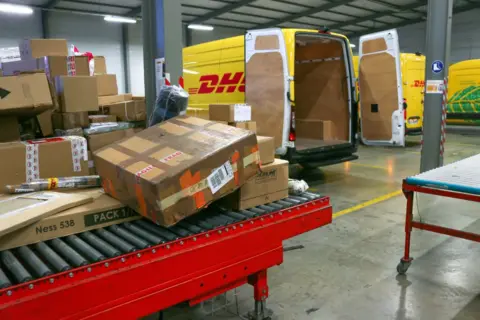Business
De minimis: How US shoppers will be hit as the tariff exemption ends

Osmond Chia & Laura BlaseyBusiness reporters in Singapore & Washington DC
 Getty Images
Getty ImagesThe US has pulled the plug on a long-running global tariff exemption that has been widely used by buyers of low-cost goods.
From Friday, imports valued at $800 (£592) or less will no longer be duty-free and will face tighter customs checks, in a move set to affect millions of shipments a day.
Last year, almost 1.4 billion packages – worth a total of more than $64bn – entered America without being charged duties under a rule called the de minimis exemption, according to US Customs.
Experts say US President Donald Trump’s policy change will hit small businesses hardest and shoppers should brace for higher prices and fewer options – at least until the dust settles.
“I’ve reached the point of acceptance, but when I first heard the news about two and half, three weeks ago, I felt like it might be the end for my business,” said Katherine Theobalds, founder and creative director of Buenos Aires-based shoe brand Zou Xou. “It still might – that remains to be seen.”
What’s the de minimis rule?
De minimis is a Latin term that broadly translates to “about the smallest things”, often used in legal contexts to describe matters too trivial to merit concern.
The de minimis exemption was introduced in 1938 to avoid the expense of collecting only small amounts of import duties in the US.
The rule’s threshold rose over the years, allowing e-commerce firms and global retailers that ship small packages to the US to thrive.
The exemption was often associated with companies like Chinese e-commerce giants Shein and Temu, which delivered Americans cheap goods that could be quickly shipped from the manufacturing source – with no warehouse stock or associated overhead costs.
But while Shein and Temu helped pioneer this way of working, many other businesses – foreign and domestic, large and small – came to incorporate the “loophole” into their supply chains and sales models.
Executives at Tapestry – the parent company of US fashion brand Coach, which is known for leather bags that sell from roughly $200 to $1,000 – told analysts this month that it expects to take a $160m hit to its profits due to changing tariff policies, with about a third of that attributed to the elimination of the de minimis rule.
Coach has rapidly expanded in recent years in a comeback campaign fuelled by Gen Z shoppers and Tapestry remains confident the momentum will offset some of the impact of tariffs. Still, the elimination of de minimis represents a logistical challenge.
Shipments under the exemption made up more than 90% of all the cargo entering the country, according to US customs.
The president and his predecessor, Joe Biden, criticised the policy as harmful to US businesses and said it has been abused to smuggle illegal goods, including drugs like fentanyl.
In a phone call with reporters on Thursday, Trump’s trade adviser, Peter Navarro, said the move will “save thousands of American lives by restricting the flow of narcotics” through the mail, as well as add $10bn a year to US coffers.
 AFP via Getty Images
AFP via Getty ImagesTrump fast-tracked the rule’s repeal with an executive order this year, well ahead of a planned 2027 expiry date.
With the necessary documentation, shippers will pay duties based on the country of origin’s tariff rate. Otherwise, they can choose to pay a fixed fee between $80 and $200 per package, according to the White House.
The second option, which is aimed to give postal services more time to adjust to the change, will only be available for six months.
Mainland China and Hong Kong were the first to be cut from the de minimis rule in May, prompting e-commerce giant Temu to halt direct sales to the US.
Letters and personal gifts worth less than $100 will still be duty-free.
Smaller variety, longer waits
US consumers may see less variety of goods in shops and on e-commerce platforms as businesses get to grips with customs documentation, trade experts have told the BBC.
Smaller firms need time to adjust as they have mostly been spared from such paperwork until now, said Tam Nguyen from logistics administration firm GOL Solution. The company handles exports from South East Asia to the US.
“You need to indicate the source of all the materials in a product, which can come from many countries with different tax rates. This would absolutely make shipments slower.”
The complexity could deter sellers from offering a broader range of products for export, she added.
That could have a particular impact on more niche markets.
Christopher Lundell, is a 53-year-old psychologist based in Portland, Oregon who also DJs and mixes music as a hobby. He is an avid vinyl record collector who recently became aware of the de minimis exemption suspension when he tried to – unsuccessfully – buy a $5 rare record from a seller in the UK.
“He cancelled my order and said, ‘I’m sorry but the UK is not shipping to the United States anymore.'”
Mr Lundell says he tries his best to find US-based record sellers before searching online for overseas sellers based in countries like the UK, Japan and China. He adds that he understands the need to protect US businesses, but says that he believes a blanket suspension of the de minimis exemption is “political theatre”.
Some orders may also be frozen for the next few weeks. Ms Nguyen said clients, including some in the healthcare sector, have halted orders.
Major postal services in the UK, Europe and and the Asia-Pacific region paused deliveries to the US this week.
The operators blamed uncertainty about how the tariffs would work and a lack of time to prepare.
Prices to rise
Without the exemption, businesses will have to factor in tariffs the US has imposed on the country of origin, which came into effect for most nations in August.
Those levies can be as low as 10% for countries like the UK and Australia, while goods from Brazil and India face the highest tariffs at 50%.
Following the change, specific duties will be imposed of $80 per item for countries with tariffs of 16% or less, $160 for shipments from countries with between 16% and 25% tariffs or $200 for items from countries with higher tariffs.
A senior administration official downplayed consumer concerns, saying that the move will “benefit” Americans by making them “safer” and “prosperous”.
Some American businesses welcomed the news, arguing the elimination would level the playing field.
“Gap Inc. welcomes the Administration’s decision to suspend duty-free de minimis treatment worldwide. The de minimis loophole has long provided an opportunity for some importers & retailers to avoid paying their fair share of US duties,” the company said in a statement.
Small firms, in particular, will feel the strain from the costly audits needed to clear US customs, making it tough for sellers to keep prices stable, said trade expert Deborah Elms.
With many postal services holding off on US shipments, sellers may have to pay for more expensive express couriers to reach American buyers for now, said Ms Elms from research firm Hinrich Foundation.
British retailer Wool Warehouse is among firms that have paused orders from the US.
“There is a lot of uncertainty at the moment” due to the short time firms have had to figure out shipment process and fees involved, said managing director Andrew Smith.
His firm hopes to resume orders to the US – its largest export market – within two weeks, he said, adding that time is needed to wait to see how other companies have responded to the changes.
Prices of its goods – mostly wool and crafting materials sourced globally – are likely to rise by up to 15%, said Mr Smith.
The company also plans to revamp its website to indicate the tariff rate chargeable for each product, he said.
“We’re aiming for full transparency so people know what it will cost with certainty and then they can decide whether they want to make the purchase or not.”
At Zou Xou, Ms Theobalds specialises in artisan-made women’s shoes, crafted by small workshops in Argentina, that sell for between $200-$300. She began her career in New York, and has focussed her business on American customers.
She has long operated a two-tier system – customers either receive shoes from a US warehouse where she keeps some stock, or shipped direct from Argentina through DHL.
Larger shipments of shoes into the US were already subject to customs fees, she says, but sending one or two pairs from Buenos Aires to a customer was achieved cheaply and efficiently because of the de minimis exemption.
Now, she’s not sure how to factor in the added costs and is exploring several options and hoping to get more clarity on how to shift her business model.
Equally important, she said, is how businesses like hers explain the changes to consumers.
She worries that even if pricing doesn’t change much, a duty process that seems too complicated could turn off even those who want a higher-end product.
“The reason our customers come to us is because they appreciate the artisanal quality. They could have always gone to a mass retailer,” she says. “But what people will have to think about is ‘does that matter to me all that much, or do I just want a pair of shoes?'”
A boost for China?
US-based retailers stand to gain if prices of goods ordered from overseas rise, Ms Elms said.
“If it’s too expensive, they’ll probably go to Walmart or Target to buy it there,” she said.
But with so many goods being sent from around world now being subject to customs duties, US consumers may once again turn to China for cheaper options.
Chinese companies like Shein and Temu have set up distribution centres in the US that will help ease some of the cost of tariffs, said Ms Nguyen.
And China is “months ahead” in figuring out the paperwork as compared to firms in other countries that are now scrambling to get up to speed, she added.
There may be fewer competitors in the overall market, as the end of the de minimis exemption makes it harder for small businesses to launch e-commerce sites, said Ms Nguyen.
“It used to be: Set up a site, list products and start shipping. But now that low-cost entry point is gone.”
Additional reporting by Nadine Yousif and Bernd Debusmann Jr
Business
Target is making big changes to win back customers. Here’s what shoppers can expect to see

A Target store in Chicago, Feb. 10, 2026.
Scott Olson | Getty Images
MINNEAPOLIS — Target customers will soon see changes on the retailer’s shelves, as the company tries to woo back shoppers during a turnaround effort that has started to catch Wall Street’s eye.
Among those shifts, Target will add more fresh and trendy groceries, a dedicated display for higher-end makeup and a larger array of merchandise for sports fans.
At the big-box retailer’s Minneapolis headquarters on Tuesday, Target’s merchandising leaders previewed the company’s ambitious plans to overhaul key categories, including home and apparel, which have posted year-over-year sales declines. The company held an investor meeting to share its holiday-quarter results and its turnaround strategy for this year, which hinges in part on regaining its reputation for stylish and unique items.
CEO Michael Fiddelke, a Target veteran who stepped into the top role on Feb. 1, told investors on Tuesday that the company is making changes that “don’t happen overnight.” But, he added, they include many tweaks that customers “will see and feel right away.”
“If I were to step back and draw a heat map of the entire store highlighting where we’re making changes this year, you’d see more change to what we sell and how we sell it than you’ve seen in a decade,” he said.
The success of Target’s merchandise makeover will help determine whether the company meets its sales and earnings outlook for the current year and whether it can reverse four consecutive quarters of declining customer traffic. The company’s revenue fell slightly in fiscal 2025 and has been stagnant for four years.
Target said Tuesday that it expects net sales for the current fiscal year to rise about 2% compared with the previous year and anticipates that sales will grow in every quarter of the year.
Wall Street had a positive early read on Target’s turnaround progress: The company’s stock climbed more than 6% on Tuesday, and was trading higher on Wednesday.
Here’s a closer look at Target’s merchandising changes:
Putting a fresher spin on grocery
Target is expanding the fresh department and adding more prominent signage for its Good & Gather private brand as it tries to draw more customers to stores for grocery shopping. This rendering shows what the expanded fruit, vegetable and meat displays will look like.
Courtesy of Target
One of the top reasons for customers’ Target trips is a simple one — running in for a quick grocery item like a gallon of milk or box of pasta. The challenge is getting shoppers to buy more of their food there.
Food is the No. 1 traffic driver for Target, and over half of customers have food in their shopping basket, said John Conlin, senior vice president of merchandising, food and beverage. Target’s grocery category, which it labels food and beverage, drew higher sales than any of Target’s merchandising segments in the past fiscal year. It grew by about 1% year over year and totaled $24.14 billion — or roughly 23% of Target’s net sales for the fiscal year.
Yet for many customers, Target is a destination for buying just a few grocery items rather than a fuller basket of food for the week. Plus, competition has grown fiercer — not only from the nation’s largest grocer by revenue, Walmart, but also from Amazon and fast-expanding discounter Aldi.
“We don’t want food to just be a business that guests are shopping while they’re at Target,” he said. “But increasingly, we want to be a business that is why guests are at Target.”
He said Target is “trying to carve our own lane with our assortment strategy” rather than copy the grocers down the street.
Going forward, Target will expand the square footage it devotes to grocery as it remodels stores and builds new ones, Conlin said. In over half of the stores that the company remodels, Target will double the square footage for fresh foods like fruits, vegetables and meats, he added.
The company also plans to add more brands that shoppers haven’t yet discovered and lean on seasonal items and private brands. To stand out from competitors, Target is going to ramp up the amount of new items by up to 50% in key categories like snacks and dry groceries, Conlin said.
But he acknowledged a challenge that has tripped up Target in recent years, which it’s tried to fix by owning its supply chain and opening a new facility in Colorado in the next year.
“None of this comes to light if we’re not in stock for our guests,” he said.
He declined to share a key detail about some items and brands that Target is adding: price points.
Giving beauty a glow up
In many of Target’s stores, customers buy lip gloss and other items from Ulta Beauty. That will change in August, after the two brands announced the end of a deal that brought the mini beauty shops to nearly a third of Target’s big-box stores.
On Tuesday, Target said it plans to give its own beauty assortment a glow up. This fall, it will open what it is dubbing its Beauty Studio in more than 600 stores and online, said Amanda Nusz, senior vice president of merchandising for essentials and beauty at Target.
Beauty Studio will replace Ulta Beauty at Target. It will be a dedicated shop within the store with prestige beauty brands, elevated lighting, enhanced service and a loyalty program tied to beauty, Nusz said. In renderings, the beauty shop looks similar to Ulta Beauty at Target, but without the beauty retailer’s branding.
Starting this fall, Target will open Beauty Studio dedicated shops in more than 600 stores and online. The prestige beauty shop will replace Ulta Beauty at Target.
Courtesy of Target
Nusz declined to share the national brands that the Beauty Studio will carry and whether it will offer some of the same brands sold by Ulta Beauty and other competitors like Sephora.
Beauty “has been one of the strongest growth engines for Target,” Nusz said. She said it was also the top growth category for Target’s curbside pickup service, Drive Up, and in-store pickup of online orders in the fourth quarter. A bonus for Target: Beauty tends to draw in younger shoppers.
The segment’s sales were roughly flat year over year in the most recent fiscal year, but accounted for about 13% of Target’s overall net sales for the period.
Along with rolling out Beauty Studio, Nusz said, Target will add more well-recognized national brands like sunscreen brand Supergoop, lean into trends like Korean beauty and invest more in men’s beauty, such as grooming and fragrance items.
Adding fun and pop culture relevance
Target has overhauled its hardlines category, which includes items like consumer electronics, books and toys. The category, which it now calls Fun101, now carries more items related to sports and pop culture. For example, it has a line of merchandise for the 30th anniversary of the movie “Space Jam.”
Melissa Repko | CNBC
In the back of Target’s stores, the retailer is giving an overhaul to a department that’s typically known for selling consumer electronics, toys and books.
Instead of calling it the traditional name, hardlines, Target coined the category Fun101.
Cassandra Jones, senior vice president of merchandising for Fun101, said the goal went beyond the new name, however. Target wanted to turn around a category that was falling flat.
Starting in late 2024, Target has had a tighter focus on four key areas: play, which includes toys like plush stuffed animals and popular brands like Lego; pop, which includes culturally inspired items like a limited-edition collection tied to Netflix’s “Stranger Things” and another linked to the 30th anniversary of the movie “Space Jam”; sport, which includes items like water bottles and licensed sports apparel for professional teams; and gadget, which includes trendy takes on products like phone cases and headphones.
On the other hand, Jones said Target has cut back on items like TVs and laptops, where it’s harder to stand out from retail competitors or inject a sense of style.
Sales of Fun101 merchandise were roughly flat year over year in the most recent fiscal year, but drove $15.8 billion, or 15%, of Target’s net sales for the period.
Jones said shoppers will see the category go bigger in the second half of the year. Target plans to open a fan shop in stores and online with licensed sports gear, expand its position as a “trading card destination” and open a “collectibles zone” for other types of merchandise.
Target’s home category has been one of its weakest performers. The retailer is overhauling the category and redoing the display area in stores, too. It showed off some of its newer items at an investor event in Minneapolis.
Melissa Repko | CNBC
Rebuilding home goods
Target used to be known for its fashion-forward yet affordable throw pillows, lamps, bedding and other home decor. The category, however, is now one of the retailer’s weaknesses — particularly as it competes with digital players like Wayfair, big-box competitors like Walmart and Costco, off-price chains like TJX‘s HomeGoods and specialty players like Crate & Barrel or Pottery Barn.
Sales in the home furnishings and decor category totaled $15.61 billion in the most recent fiscal year, sinking by nearly 7% year over year. That’s a deeper sales drop than in any of Target’s other key merchandise categories.
The big-box retailer is working to become a destination for the category again, said Mara Sirhal, senior vice president of merchandising for home, who stepped into the role about three months ago.
“Our home business has not delivered to its potential, point-blank,” she said. “The industry grew. Target home underperformed. We lost meaningful share over the last two years, and our authority and style inspiration has weakened. That is on us.”
Among the problems, she said, Target “lost clarity in our point of view,” with a blander assortment rather than a stylish, eye-catching one.
Sales of home goods at Target have also been hurt by economic factors, including higher interest rates and pricier homes in the U.S., which have led to a much older first-time homebuyer, she said.
Starting in June, Target will rebuild the category as part of a multiyear turnaround effort, she said. One of its first moves this summer will be redoing about 75% of its assortment in decorative home, which includes items like candlesticks, throw pillows and greenery. By the fall, she said, three-quarters of its bedding assortment will be reinvented. And next year, she said, Target will overhaul its kitchen and dining merchandise.
It won’t just be the products changing, she said. Shoppers should expect to see new fixtures in stores, too, such as elevated wood displays. It will also use its third-party marketplace, Target Plus, to sell large items that are easier to carry online, such as rugs, mattresses and furniture, she said.
To try to turn around its apparel sales, Target is using an artificial intelligence tool, Trend Brain, to help the company spot the styles that customers want earlier and speed those looks to shelves. The tool helped the company develop a collection of Western-inspired clothing and accessories.
Melissa Repko | CNBC
Speeding up fashion and raising the bar on basics
Another well-known category in Target stores has become a weaker link, too. Apparel and accessories sales at the company fell to $15.74 billion in the most recent fiscal year, down about 5% from the prior year.
To drive sales growth again, the big-box retailer aims to spot trends earlier, speed up the time it takes for new looks to hit shelves and sharpen the selection of clothing that it carries — even for basics like tank tops, said Gena Fox, senior vice president of apparel and accessories at Target.
She said the company’s performance “has not been where we want it to be over the past year.”
Denim, T-shirts and tanks make up about 25% of Target’s total assortment, Fox said. Last year, it overhauled its denim to raise the quality and style, which led to a 10% year-over-year lift in sales for that category.
This year, she said, Target plans to take that same approach to fix T-shirts and tanks, which have had weaker sales. Some of those refreshed closet staples are starting to hit store shelves and Target’s website.
Target is also working to get ahead of trends, which it features in collections in stores and online, she said. To spot trends, it’s using a new artificial intelligence-powered tool called Target Trend Brain, which helps the company’s designers and merchants identify the styles, colors and materials that customers may want.
For example, insights from Trend Brain helped inspire a Western edit of clothing and accessories like purses with fringe and belts with embroidery, with all items under $40. That area will soon rotate to a collaboration with Roller Rabbit, a colorful and brightly patterned pajama brand, that will include swimwear, sundresses and pool accessories.
Target is known for its limited-time brand collaborations. For the spring, it has a new line of swimsuits, pool accessories and more developed with pajama brand Roller Rabbit.
Melissa Repko | CNBC
Fox said the apparel and accessories timeline is now about 40% faster as the company reacts more in the moment rather than planning six to 12 months in advance.
Along with those trend-driven items, Target will expand national brands and add new partnerships. Last week, the company announced it would bring Levi’s to more stores, which will mean the denim brand is in more than 1,000 — or roughly half — of its stores, Fox said. It also developed an exclusive clothing line with country music singer Megan Moroney, which will coincide with her upcoming tour.
Business
Disney launches its Adventure cruise ship — a new foothold in Southeast Asia

Disney’s cruise line is going big in Asia.
This month, the company’s eighth and largest ship, the Disney Adventure, will embark on its maiden voyage, carrying passengers on three- and four-night journeys at sea from its berth in Singapore.
The vessel accommodates a whopping 6,700 passengers, around two-thirds more capacity than Disney’s Wish class ships, which are the Disney Wish, the Disney Treasure and the Disney Destiny. The Adventure can also carry around 2,500 crew members, about 1,000 more than on the Wish class ships.
“It takes a village to be able to support the type of service that we’re known for,” Joe Schott, president of Disney Signature Experiences, told CNBC.
The Disney Adventure sets sail at a time of rapid expansion for Disney’s cruise line. It is one of six vessels set to join the fleet by 2031. It’s also emblematic of the company’s global aspirations, which coincides with a sharp decline in international visitors venturing to the United States.
Mickey and Minnie Mouse pose in front of the Disney Adventure.
Disney
While tourism grew worldwide last year, the United States was the only major destination to see a drop in foreign visitors, according to the World Travel & Tourism Council. Overall, international travel to the U.S. fell 6%, the organization found. That decline continued into 2026, as January’s numbers were down 4.8% compared with the same month a year prior.
Travel bans, visa fees and invasive searches at ports of entry are all contributing to international travelers leaving the United States off their travel itineraries, according to the WTTC. Trade frictions, geopolitical unease and safety concerns have also contributed to the drop in demand for travel stateside, travel experts told CNBC.
Still, Disney’s domestic theme parks drive around two-thirds of revenue in its experiences division, which includes parks, cruises, resorts and consumer products. International destinations account for around one-fifth of revenue.
Expanding its fleet to new ports allows Disney to entice guests that may not have otherwise been able to venture to its theme parks or get on board one of its cruise ships. And Asia is a rapidly growing market.
A whole new market
Disney is no stranger to the Asian market. It already has a strong footprint of theme parks and resorts in Tokyo, Hong Kong and Shanghai.
“We have a really strong presence already up in the the northern part of Asia,” Schott said. “But, I think as you think about the southeast part of Asia, we don’t really have a physical presence. So, this is a great way to really be able to connect a whole lot of people that haven’t had the opportunity to do a physical Disney experience before.”
The cruise industry, in particular, in Asia has been in a state of rapid growth in the wake of the pandemic. In 2024, the region accounted for 2.6 million cruise passengers, a 13% increase from the previous year, according to data from the Cruise Lines International Association.
“Prior to 2024 we were really seeing a rise in the disposable income and the income levels of Southeast Asian travelers,” said Dulani Porter, executive vice president and partner at Spark, a creative agency that works with hospitality and tourism brands. “And so it was a very, very important market for any international tourism organization.”
That’s where the Disney Adventure comes in.
Initially destined to be a floating casino, the ship went up for sale part way through its construction when its parent company, Genting Hong Kong, went bankrupt in 2022. Disney swooped in and bought it.
“I think this was a great opportunity, because if we hadn’t acquired the ship the way we did, we wouldn’t be going into this market as soon as we are,” said Bruce Vaughn, president and chief creative officer of Walt Disney Imagineering. “And that’s a great thing.”
Previously, all of Disney’s cruise ships have left from domestic ports in Florida before traveling to international destinations. In the case of the Adventure, the ship is the destination. Stationed in Singapore, the vessel will voyage entirely at sea, with no port calls.
And Disney says demand is already there. Disney’s cruises are already 80% booked for fiscal 2026, Schott said.
A ‘brand ambassador’
The Disney Adventure’s size isn’t the only thing that sets it apart from the rest of the fleet. The ship has been tailored for consumers in Asia.
“Since the ship is going to be dedicated to Singapore and that market, we also wanted to make sure that we address what we thought would be unique to them,” said Vaughn.
This came in the form of selecting franchises and characters that are popular in the region, designing entertainment and relaxation areas catered to local tastes and providing a diverse selection of menus across its restaurants.
“We’re looking forward to servicing a brand-new audience,” Schott said. “In that respect, the ship is a brand ambassador.”
Guests on board the Adventure will be immersed in Disney’s more than 100 years of storytelling with character meet-and-greets as well as themed shopping and entertainment areas.
Situated in the middle of the ship is a deck designed to look like a street from San Fransokyo, the fictional city in “Big Hero 6.” The area is home to arcade games inspired by the movie, a replica of the Lucky Cat Cafe owned and operated by Aunt Cass as well as four movie theaters and dedicated tween and teen spaces.
A view of San Fransokyo street aboard the Disney Adventure.
Disney
The street also features the first-ever Duffy and Friends store at sea and a National Geographic shop. Disney executives told CNBC that these brands are incredibly popular with consumers in the region.
Duffy the Disney Bear is a character that was developed initially for a merchandise line at Walt Disney World’s Disney Springs, but gained attention when it was brought to Tokyo a few years later. In the last two decades, Duffy has been joined by seven other stuffed animal friends and has become one of the bestselling merchandise lines for the company.
In 2023, Disney reported the character generated $500 million in sales annually.
Disney characters in traditional Han costumes perform on the stage during a special edition of “Enjoying the Moon with Duffy and Friends” event celebrating the Mid-Autumn Festival at the Shanghai Disney Resort on September 17, 2024 in Shanghai, China.
Vcg | Visual China Group | Getty Images
In designing the Disney Adventure, the company was also conscious of local traditions. For many in Asia, vacations aren’t just for a nuclear family, but for extended family and even large groups of friends.
“I think one of the biggest distinctions that I’m seeing with South Asian cultures [is] travel really is about spending more time together,” Porter said. “Not to generalize, but North American cruisers will choose cruising because the kids can go do their thing and the parents can go do their thing, all contained into a ship.
“For Asian travelers, that is a very meaningful time spent together, where the grandparents and the kids and the parents and the grandparents, everybody is really trying to maximize all of that time together,” she said.
Both Vaughn and Schott detailed layers of experiences available to cruise guests that cater to different age ranges, both kids and kids at heart.
There’s Marvel Landing on the upper deck of the ship that features a rollercoaster, a spinning attraction and car-chase ride all inspired by The Avengers. In the same area is a sundeck, infinity pool and a bar.
Wayfinder Bay is an open-air area with amphitheater-like seating that doubles as a performance venue. And there’s D Lounge, which features a number of private karaoke rooms.
“We’ve had to think about that quite extensively in our parks in the region … multigenerational travel is just part of the formula,” said Schott.
Also part of the formula is Disney’s dining experience.
Aboard the Disney Adventure, guests will have an eclectic selection of food and beverages to try, with an emphasis on flavors that are popular in the region.
The Disney Adventure will have burgers and classic American fare at Stitch’s Ohana Grill, bubble teas at the Ursula-inspired Bewitching Boba and Brews, as well as pitas and kebabs at the Ms. Marvel-inspired Cosmic Kebabs.
There will also be Indian cuisine at Mowgli’s Eatery and Polynesian-inspired fare at Gramma Tala’s Kitchen.
Rotational dining is also featured on the cruise ship, a staple of Disney’s service.
While passengers have the option to grab quick-service meals and snacks throughout the ship, several of its restaurants are included in a prescheduled dining plan. Guests have reservations for each of these themed restaurants and rotate through them during their cruise.
Disney rotates the restaurant staff, too, to follow each group of passengers to their scheduled restaurant. As a result, guests have the same servers, busboys and restaurant managers throughout their trip, and the waitstaff gets to know the guests — and their preferences.
“I think at the end of the day, this entry into the market needs to be a really strong one for us,” Schott said. “So we’re looking forward to really being able to deliver the Disney-level of service at an extraordinary level.”
Business
Stock markets rebound and energy prices ease but fears remain over Iran war

European and US stock markets have recovered and oil and gas prices eased, sending some relief to investors after a bruising start to the week despite war in the Middle East stoking fears about the longer-term hit to the economy.
In the UK, the FTSE 100 gained about 80 points to close 0.8% higher at 10,567.65, having slumped nearly 3% on Tuesday amid worries of a prolonged conflict.
Stocks were also rebounding across Europe, with Germany’s Dax up 1.8% at the end of the day, and France’s Cac rising 0.8%.
Over on Wall Street, trading got off to a positive start, with the S&P 500 up 0.85% and Dow Jones 0.65% higher by the time European markets closed.
Global financial markets are largely being led by the movement of wholesale energy prices, which were spiking on Monday and Tuesday as concerns grew about disruption to supply in affected parts of the Middle East.
But there was some steadying to prices on Wednesday, with Brent crude oil down about 0.5% to 80.9 dollars a barrel, and a European benchmark for natural gas slipping by about 9%.
Despite easing back slightly, the prices of both commodities remains substantially higher than last week.
Analysts at Cornwall Insights warned on Wednesday that household energy bills are forecast to rise by 10% from July following the sharp increases in wholesale gas prices.
However, it said the final price cap figure would be based on average wholesale prices over a three-month period, meaning that it would depend on how long gas prices stayed elevated and how long the period of volatility continued.
The share prices of London-listed energy giants BP and Shell were down about 2% on the back of easing prices.
Russ Mould, investment director for AJ Bell, said: “The FTSE 100 and other European markets took their cue from US gains to trade firmly higher, with some of the names caught up in the heavy selling at the start of the week bouncing back from their lows.
“This presents a salutary reminder to investors caught up in the recent volatility that ups and downs are a natural feature of financial markets.
“But the waters remain choppy. Wall Street has been oscillating between healthy gains and more modest moves higher, which hints at continuing nervousness about the outlook amid what remains a fast-moving set of events in the Middle East.”
-

 Business6 days ago
Business6 days agoIndia Us Trade Deal: Fresh look at India-US trade deal? May be ‘rebalanced’ if circumstances change, says Piyush Goyal – The Times of India
-

 Politics7 days ago
Politics7 days agoWhat are Iran’s ballistic missile capabilities?
-

 Business1 week ago
Business1 week agoHouseholds set for lower energy bills amid price cap shake-up
-

 Politics7 days ago
Politics7 days agoUS arrests ex-Air Force pilot for ‘training’ Chinese military
-

 Business6 days ago
Business6 days agoAttock Cement’s acquisition approved | The Express Tribune
-

 Fashion1 week ago
Fashion1 week agoOECD GDP growth slows to 0.3% in Q4 amid mixed trends
-

 Fashion6 days ago
Fashion6 days agoPolicy easing drives Argentina’s garment import surge in 2025
-

 Sports1 week ago
Sports1 week agoTop 50 USMNT players of 2026, ranked by club form: USMNT Player Performance Index returns






